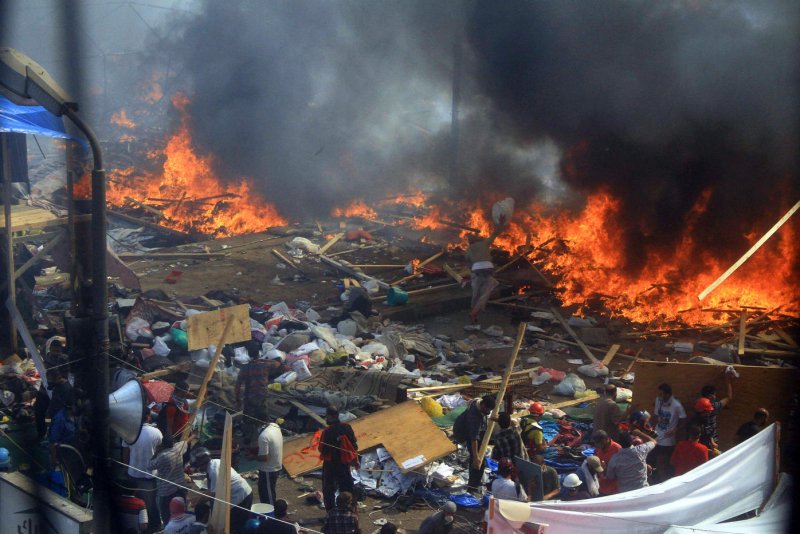Tents burn while supporters of ousted President Mohammed Morsi gather outside of Rabaa al-Adwya square after police swept into their encampment with armored vehicles and bulldozers in the Nasr City district, in Cairo on August 14, 2013. Hundreds of people were killed and thousands injured. File Photo by Ahmed Asad/UPI |
License Photo
CAIRO, July 3 (UPI) -- On June 30, 2012, Muslim Brotherhood figure Muhammad Morsi took the oath of office, becoming Egypt's president and fulfilling a more than an 80-year political project.
A year later, millions of Egyptians took to the streets, protesting Morsi's rule. Four years on and the Muslim Brotherhood is out of politics in Egypt, designated as a terrorist group and devoid of any real popular support in the country of its birth.
"Look at the Brotherhood now," said Mokhtar Noah, a former member of the group. "It has never been weaker."
The Muslim Brotherhood is in tatters, with half of its leaders in jail and the other half in exile. Support for the group is at an all-time low amid rejection of the group's violent rhetoric after Morsi's ouster and because of the government's massive security clampdown.
This, however, is less about the Muslim Brotherhood and Egypt than the state of political Islam throughout the Arab region, experts said.
The Muslim Brotherhood's rise in Egypt, Tunisia, Libya and Morocco following the "Arab spring" emboldened its branches in Syria, Yemen and elsewhere to push for change.
"This was why this rise was cautiously welcomed in the Gulf, where Brotherhood sleeper cells awaited their moment of empowerment," said Ekram Badr el-Din, a political science professor at Cairo University. "The Muslim Brotherhood wanted to rule everywhere, even though it did not have a practical program."
In Egypt, the group's development program, known as the Renaissance Project, was hardly successful. Economic development stalled and Muslim Brotherhood leaders — until then an unofficial opposition group — seemed more interested in pushing for the Islamization of society than securing economic development.
Deputy Muslim Brotherhood Supreme Leader Khairat el-Shater conceded in 2013 that the project was only a set of random thoughts, not a full program for Egypt's development.
This lack of real solutions caused the group's failure in Egypt, Noah said.
"They did not expect to come to power so early, which was why they were not prepared when this happened," he said. The Muslim Brotherhood initially said it would not put forward a presidential candidate after Egypt's 2011 revolution but did so.
Morsi's year in office was full of controversy, failings and public discontent. He entrenched division rather than seeking to unify ranks after a divisive post-revolutionary period and the Brotherhood proved to be full of political novices.
Following a series of political and judicial crises, along with concerns from Egypt's military about the direction the country was heading, Morsi's ouster was assured.
"When Egyptians rose up against him, there was nobody to defend him but the members of his movement, only a fraction of the population," Badr el-Din said.
The end of the Brotherhood's project in Egypt, the uncertain prospects of the group's affiliates in other North African countries and the regional move to designate it a terrorist group demonstrate that political Islam is on the way out, experts said.
However, the rise of the Islamic State across the region, as well as the resurgence of al-Qaida in many areas, remains a major cause for concern.
In early 2013, senior Islamist figure Tarek al-Zomor, who spent nearly three decades in jail for participating in the assassination of Egyptian President Anwar Sadat, made a comment that was viewed as prescient.
Zomor said Islamist movements would not resort to violence so long as change via political means was possible.
"Violence only happens when there is no hope of change via political means," Zomor told the private Egyptian Dream TV.
In 2012, Zomor and other Islamists from Jamaat Islamiya formed the Building and Development Party. When Morsi was ousted, he fled to Turkey, like many other Islamists.
In Egypt, the Muslim Brotherhood has been routed and ultra-orthodox Salafist parties have seen their support wane. The rest of the region is also witnessing a general state of fatigue toward Islamist groups. Is this the end of the political Islam project in the region?
"It all depends on whether these states will present a successful model of the secular rule that solves the problems of their citizens," said Sameh Eid, an expert on Islamist groups. "This model's success will make it difficult for Islamists to claim that they hold the keys to a better future."
This article originally appeared at The Arab Weekly.















